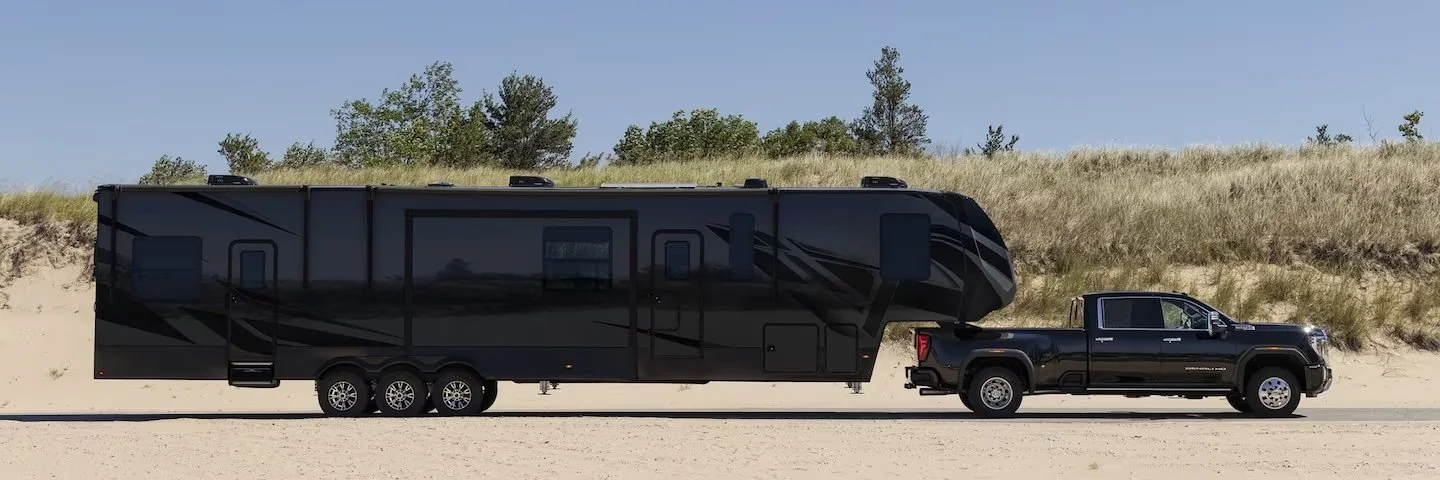Towing differences between a Fifth wheel and a travel trailer like an Airstream.
Our 2022 Airstream Globetrotter tows beautifully behind our 2022 Ford F-350 Super Duty.
When Janet and I were looking at adding a towable RV to our RV experience, we were first intrigued with the roominess and outside storage capacities of a fifth wheel. I also liked the idea of towing a fifth wheel in terms of stability. However we ultimately went with an Airstream, which in my opinion is the best towing experience for hitch towed trailers.
However, what makes the airstream a great and safe towable, it’s also what makes it a smaller living space and very limited outdoor storage. Its low center of gravity and curved sidewalls create a very aerodynamic and stable tow, but definitely that is a trade off for when you arrive.
A Fifth wheel may be the best option for you if you want a very stable tow, along with the most living area and storage you can get in an RV. So let’s take a look at the difference between towing a fifth wheel and a bumper hitch travel trailer.
Towing a fifth wheel RV and a travel trailer are two different ways of towing a recreational vehicle (RV), each with its own unique features and benefits.
Hitching Mechanism: The main difference between towing a fifth wheel RV and a travel trailer is the hitching mechanism. A fifth wheel RV connects to the towing vehicle using a hitch that is mounted in the bed of a pickup truck. The hitch is typically a large, flat plate that attaches to the kingpin on the front of the fifth wheel trailer. In contrast, a travel trailer connects to the towing vehicle using a hitch that is mounted on the rear of the vehicle, such as a bumper hitch or a frame-mounted hitch.
Maneuverability: Another difference is the maneuverability of the two types of RVs. A fifth wheel RV typically has a shorter overall length than a travel trailer (except for the giant toy haulers), but it has a longer wheelbase. This means that a fifth wheel RV is generally more stable and easier to tow than a travel trailer, especially at higher speeds. However, because the hitch is located in the bed of the truck, it can be more challenging to maneuver in tight spaces, such as parking lots. On the other hand, a travel trailer can be more maneuverable because it is hitched to the rear of the towing vehicle, but it can be more susceptible to sway and instability, especially in windy conditions.
Interior Space: Fifth wheel RVs generally offer more interior space and amenities than travel trailers. This is because fifth wheel RVs have a raised forward section that extends over the bed of the pickup truck, allowing for a more spacious and comfortable living area. In contrast, travel trailers are designed to be more lightweight and compact, which can make them less spacious and less comfortable for long-term living.
Towing Capacity: Because of their hitching mechanism, fifth wheel RVs generally have a higher towing capacity than travel trailers. This is because the hitch is mounted directly over the rear axle of the towing vehicle, which can distribute weight more evenly and reduce the risk of swaying. In contrast, travel trailers are generally limited by the towing capacity of the towing vehicle, which can be lower due to factors such as the type of hitch and the weight distribution.
Fifth Wheels, while larger, have a towing advantage. With the right truck that is.
In summary, the main differences between towing a fifth wheel RV and a travel trailer are the hitching mechanism, maneuverability, interior space, and towing capacity. Choosing between the two types of RVs will depend on your personal preferences and needs, as well as the capabilities of your towing vehicle.



